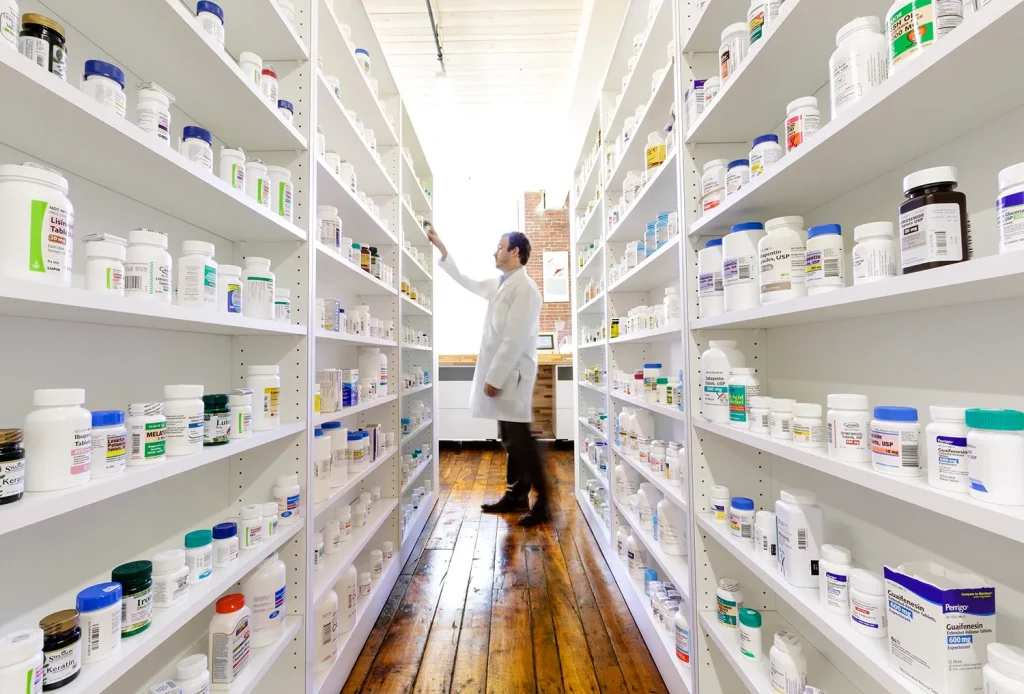It is important to know the scope of pharmacy. Pharmacy is a crucial field in the healthcare industry, focusing on the safe and effective use of medications. Pharmacists play a vital role in ensuring patients receive the right drugs at the right doses, and they provide valuable healthcare advice to both patients and other healthcare professionals in the scope of pharmacy.
Evolution of Pharmacy
Pharmacy has a rich history dating back to ancient civilizations where healers and shamans would use natural remedies to treat ailments. Over time, pharmacy evolved into a more systematic practice, with the establishment of apothecaries and the development of pharmaceutical science.
Importance of Pharmacy
Healthcare Sector
Pharmacists are integral members of the healthcare team, collaborating with physicians and other healthcare providers to optimize patient outcomes.
Research and Development
Pharmacy drives innovation in drug discovery and development, leading to the introduction of new medications that improve patient care and quality of life.
Scope of Pharmacy Education
Academic Programs
Pharmacy education encompasses a wide range of academic programs, including bachelor’s, master’s, and doctoral degrees in pharmacy.
Specializations
Pharmacists can specialize in various areas such as clinical pharmacy, pharmacotherapy, pharmaceutical sciences, and pharmacy administration.

Career Opportunities in Pharmacy
Community Pharmacy
Community pharmacists work in retail settings, providing prescription medications, over-the-counter products, and healthcare advice to patients.
Hospital Pharmacy
Hospital pharmacists are responsible for dispensing medications within a hospital setting, collaborating with healthcare teams to ensure safe and effective medication use.
Pharmaceutical Industry
Pharmacists play key roles in pharmaceutical companies, contributing to drug development, regulatory affairs, marketing, and sales.
Role of Pharmacists in Healthcare
Patient Care
Pharmacists provide patient-centered care, offering medication therapy management, immunizations, and health screenings.
Medication Management
Pharmacists ensure patients understand their medications, including proper usage, potential side effects, and interactions with other drugs.
Health Promotion
Pharmacists promote health and wellness through medication adherence, smoking cessation programs, and disease prevention initiatives.
Technological Advancements in Pharmacy
Automation
Pharmacies are increasingly adopting automation technologies to streamline medication dispensing and improve efficiency.
Digitalization
Digital health platforms enable pharmacists to provide remote patient counseling, medication monitoring, and telehealth services.
Review Prescriptions
Telepharmacy allows pharmacists to remotely review prescriptions, provide consultations, and offer medication therapy management services to underserved communities.
Challenges in Pharmacy Practice
Regulatory Changes
Pharmacists must navigate evolving regulations and guidelines governing drug dispensing, compounding, and patient care.
Drug Shortages
Shortages of essential medications pose challenges for pharmacists, requiring them to find alternative treatment options and manage inventory effectively.
Patient Compliance
Ensuring patient adherence to medication regimens remains a significant challenge for pharmacists, requiring education, counseling, and follow-up.

Future Trends in Pharmacy
Personalized Medicine
Advancements in pharmacogenomics enable personalized medication therapy based on an individual’s genetic makeup and disease characteristics.
Precision Pharmacy
Precision pharmacy aims to tailor drug therapies to specific patient populations, maximizing efficacy while minimizing adverse effects.
Integration of AI and Machine Learning
Artificial intelligence and machine learning technologies are revolutionizing pharmacy practice, facilitating drug discovery, medication optimization, and predictive analytics.
Pharmacy is an indispensable aspect of healthcare, encompassing various roles and responsibilities crucial for ensuring optimal patient outcomes. In this article, we delve into the multifaceted importance of pharmacy, highlighting its significance in modern healthcare systems.
Understanding Pharmacy’s Role in Healthcare
Pharmacy serves as the backbone of healthcare delivery, bridging the gap between patients and medications. Pharmacists, as medication experts, play pivotal roles in medication management, patient education, and promoting health and wellness.
Enhancing Patient Safety and Adherence
One of the primary responsibilities of pharmacists is to ensure patient safety through accurate dispensing of medications and thorough medication counseling. By fostering medication adherence and providing tailored medication regimens, pharmacists contribute significantly to improved patient outcomes.
Supporting Chronic Disease Management
In order to effectively manage chronic conditions including diabetes, hypertension, and asthma, pharmacy is essential. Pharmacists collaborate with healthcare teams to optimize medication therapies, monitor patient progress, and empower patients to take control of their health.
Addressing Public Health Challenges
Pharmacists are frontline healthcare providers involved in various public health initiatives, including vaccination programs, smoking cessation campaigns, and health screenings. Their expertise and accessibility make them valuable assets in promoting community health and preventing diseases.
Embracing Technological Advancements
Advancements in pharmacy technology, such as automation and digital health platforms, streamline pharmacy operations and enhance patient care. These innovations enable pharmacists to focus more on patient-centered activities and improve medication management processes.
Expanding Access to Healthcare Services
Pharmacists serve as accessible healthcare resources, particularly in underserved communities where access to primary care may be limited. Through initiatives like tele pharmacy and medication therapy management, pharmacists extend healthcare services to remote areas, improving healthcare equity.
Patient Safety
The importance of pharmacy in healthcare cannot be overstated. From ensuring patient safety to supporting chronic disease management and promoting public health, pharmacists play diverse and essential roles in improving healthcare outcomes and enhancing the overall well-being of individuals and communities.
A pharmacy serves many purposes beyond merely dispensing medication. It encompasses a wide range of services and responsibilities aimed at ensuring safe and effective medication use, promoting health and wellness, and improving patient outcomes.
Importance of Pharmacy in Healthcare
Patient Safety
Ensuring patient safety is paramount in pharmacy practice. Pharmacists play a key role in verifying prescriptions, checking for potential drug interactions or allergies, and counseling patients on proper medication use to minimize risks and adverse effects.
Medication Management
Pharmacists are medication experts, responsible for managing complex medication regimens, optimizing drug therapies, and monitoring patient responses to treatment. They work closely with healthcare providers to tailor medication regimens to individual patient needs and preferences.
Public Health Initiatives
Pharmacists are actively involved in various public health initiatives aimed at promoting health and preventing diseases. From administering vaccinations to providing smoking cessation counseling and conducting health screenings, pharmacists play a vital role in improving community health outcomes.
Pharmacists as Healthcare Providers
Medication Experts
Pharmacists undergo extensive education and training to become medication experts. They possess in-depth knowledge of pharmacology, drug interactions, and medication management, allowing them to provide comprehensive medication therapy management to patients.
Patient Educators
Pharmacists serve as valuable resources for patient education, providing information on medications, disease management, and lifestyle modifications. They empower patients to take an active role in their healthcare by promoting medication adherence and healthy behaviors.

Health Advocates
Pharmacists advocate for patients’ health and well-being by advocating for access to affordable medications, promoting health equity, and raising awareness about public health issues. They collaborate with other healthcare providers to address healthcare disparities and improve healthcare access for underserved populations.
Collaborative Healthcare Approach
Interprofessional Collaboration
Pharmacists work collaboratively with other healthcare providers, including physicians, nurses, and allied health professionals, to deliver patient-centered care. They participate in interdisciplinary healthcare teams, contributing their expertise to develop comprehensive treatment plans and optimize patient outcomes.
Team-Based Care
In team-based care models, pharmacists take on expanded roles, such as medication therapy management, chronic disease management, and preventive care services. By working closely with other healthcare professionals, pharmacists ensure seamless coordination of care and holistic patient support.
Challenges Faced by Pharmacists
Regulatory Compliance
Pharmacists must navigate complex regulatory frameworks governing medication dispensing, compounding, and documentation. Staying compliant with ever-changing regulations requires continuous education and vigilance to ensure patient safety and regulatory adherence.
Workload Pressures
Pharmacists often face high workload pressures, particularly in busy retail or hospital settings. Balancing medication dispensing duties with patient counseling, medication reviews, and administrative tasks can be challenging, leading to burnout and job dissatisfaction.
Evolving Healthcare Landscape
The healthcare landscape is constantly evolving, with advancements in technology, changes in reimbursement models, and shifts in healthcare policies. Pharmacists must adapt to these changes, embrace innovation, and advocate for policies that support their role as essential healthcare providers.
Technological Advancements in Pharmacy
Automation
Automation technologies, such as robotic dispensing systems and automated medication packaging, streamline pharmacy operations and improve efficiency. By automating routine tasks, pharmacists can focus more on patient care activities and medication management services.
Electronic Health Records
Electronic health records (EHRs) facilitate communication and collaboration among healthcare providers, enabling seamless exchange of patient information and medication histories. Pharmacists use EHRs to document medication therapy interventions, monitor patient progress, and ensure continuity of care.
Future Trends in Pharmacy Practice
Personalized Medicine
Advancements in pharmacogenomics and precision medicine enable personalized medication therapies tailored to individual patient characteristics and genetic profiles. Pharmacists play a vital role in implementing personalized medicine approaches, optimizing medication regimens, and minimizing adverse drug reactions.
Digital Health Solutions
Digital health solutions, such as mobile health apps, wearable devices, and remote monitoring technologies, revolutionize pharmacy practice. Pharmacists leverage digital health tools to provide virtual medication counseling, medication adherence reminders, and chronic disease management support.
Population Health Management
Population health management initiatives focus on improving health outcomes for entire patient populations by addressing social determinants of health, promoting preventive care, and managing chronic diseases more effectively. Pharmacists contribute to population health efforts through medication management services, health screenings, and community outreach programs.
Medication Adherence
Pharmacy’s role in healthcare is multifaceted and indispensable. Pharmacists play critical roles in ensuring patient safety, promoting medication adherence, and improving public health outcomes. By embracing innovation, collaborating with other healthcare providers, and advocating for patient-centered care, pharmacists continue to make significant contributions to the healthcare system.
Pharmacy practice has transformed from traditional dispensing-focused models to more patient-centered and clinically oriented approaches. Pharmacists now play expanded roles in healthcare delivery, focusing on optimizing medication therapy and improving patient outcomes.

Evolution of Pharmacy Practice
Traditional Pharmacy Models
Historically, pharmacies primarily served as dispensing outlets, where pharmacists filled prescriptions and provided basic medication counseling. The focus was on product-oriented tasks rather than patient care.
Transition to Clinical Pharmacy
In recent years, there has been a shift towards clinical pharmacy practice, emphasizing direct patient care and medication management services. Pharmacists now collaborate with healthcare teams to ensure safe and effective medication use, monitor patient outcomes, and promote health and wellness.
Technological Advancements in Pharmacy
Automation and Robotics
Pharmacies are increasingly adopting automation and robotics to streamline medication dispensing processes, reduce medication errors, and improve efficiency. Automated dispensing systems and robotic pill dispensers enhance accuracy and safety in medication dispensing.
Dispensing
Tele pharmacy services leverage technology to provide remote medication counseling, medication therapy management, and prescription dispensing to underserved communities. Tele pharmacy improves access to healthcare services, particularly in rural areas with limited access to traditional pharmacies.
Patient-Centered Care and Counseling
Medication Therapy Management
Pharmacists offer comprehensive medication therapy management services, including medication reviews, adherence counseling, and medication reconciliation. They work closely with patients to optimize drug therapies, minimize adverse effects, and improve treatment outcomes.
Health Promotion and Disease Prevention
Pharmacists play a vital role in promoting health and preventing diseases through patient education, health screenings, and lifestyle interventions. They provide valuable guidance on medication adherence, smoking cessation, weight management, and immunizations.
Integrative Medicine and Alternative Therapies
Herbal Medicine
There is growing interest in complementary and alternative therapies, including herbal medicine and dietary supplements. Pharmacists are increasingly involved in providing evidence-based information on herbal products, drug interactions, and potential risks.
Acupuncture and Traditional Chinese Medicine
Integrative medicine approaches, such as acupuncture and traditional Chinese medicine, are gaining popularity as adjunctive therapies for various health conditions. Pharmacists collaborate with healthcare providers to ensure safe and effective use of these therapies in conjunction with conventional treatments.
Pharmacogenomics and Personalized Medicine
Tailored Drug Therapies
Pharmacogenomics involves studying how genetic variations influence drug responses and metabolism. Pharmacists use genetic testing and personalized medicine approaches to tailor drug therapies to individual patient characteristics, maximizing efficacy and minimizing adverse effects.
Genetic Testing in Drug Response Prediction
Advancements in genetic testing enable pharmacists to predict how patients will respond to certain medications based on their genetic makeup. Pharmacists use this information to optimize medication regimens, select appropriate drug dosages, and avoid adverse drug reactions.
Expanding Roles of Pharmacists
Vaccination Services
Pharmacists play an essential role in administering vaccinations, expanding access to immunization services, and promoting public health. They provide immunizations for influenza, pneumococcal disease, shingles, and other vaccine-preventable illnesses.

Chronic Disease Management
Pharmacists are actively involved in managing chronic diseases such as diabetes, hypertension, and asthma. They collaborate with healthcare teams to monitor patient progress, adjust medication regimens, and provide ongoing support for disease management.
Evolution
The field of pharmacy practice is continually evolving to meet the changing needs of patients and healthcare systems. Pharmacists are expanding their roles beyond traditional dispensing duties, focusing on patient-centered care, technology integration, and personalized medicine approaches.
Conclusion
Pharmacy plays a vital role in healthcare delivery, encompassing various career opportunities and specialties. As the field continues to evolve, pharmacists must adapt to technological advancements, regulatory changes, and shifting healthcare landscapes to ensure optimal patient care.
FAQs
- How do pharmacists contribute to patient safety?
- Pharmacists ensure patient safety through accurate medication dispensing, thorough counseling, and monitoring for potential drug interactions or adverse effects.
- What roles do pharmacists play in chronic disease management?
- Pharmacists collaborate with healthcare teams to optimize medication regimens, monitor patient progress, and provide ongoing support for chronic disease management.
- How do technological advancements impact pharmacy practice?
- Technological innovations such as automation and digital health platforms streamline pharmacy operations, improve efficiency, and enhance patient care.
- What public health initiatives involve pharmacists?
- Pharmacists are involved in various public health initiatives, including vaccination campaigns, smoking cessation programs, and health education initiatives aimed at promoting community health.
- How do pharmacists contribute to healthcare accessibility?
- Pharmacists serve as accessible healthcare providers, particularly in underserved communities, offering services like tele pharmacy and medication therapy management to extend healthcare access.







